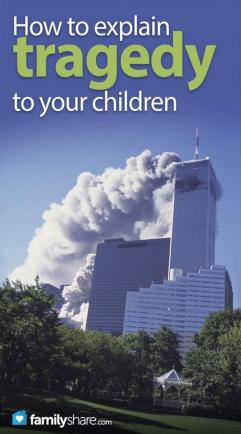
I remember where I was when 9/11 happened. It was early morning on the West Coast, and I had just turned on my TV before starting our homeschooling day. I saw the first tower burning, and then, to my horror, a plane flew into the second tower. I knew immediately that I was witnessing history. I set aside our scheduled activities and stayed glued to the TV as events unfolded. Tears came to my eyes and my heart ached for all the people affected by this tragedy.
I failed to take into consideration how this event may affect my children, who were watching along with me. We had many conversations about how this could have happened, and I think I did a pretty good job comforting them. But I believe I would have done things differently if I had given the situation greater thought.
As parents, we work hard to create a happy, safe, secure environment for our children. However, we live in a volatile world. Unthinkable violent crimes, acts of terror and natural disasters encroach upon our happy world and frighten our children. Bad things happen. How do we help our children to understand these events and cope with the fear they elicit?
Talk about it
The Mayo Clinic says that talking to your child about the tragedy will help him understand what has happened, feel safe and begin to cope. Ask your child what he already knows about the situation. Tell the truth. Share basic information, but skip the scary details. Encourage him to ask questions about anything he doesn't understand. Remember that children are very egocentric - they believe the world revolves around them. You may need to reassure your child that the tragedy was not his fault.
Acknowledge your child's fears
It is normal for your child to feel frightened by this kind of event. Acknowledge her fears and do not dismiss her feelings. Comfort her and let her know that things will be all right. Remind her that you will be there for her.
Put it in perspective
You would think from watching the news that tragedies are common place. Family therapist Carleton Kendrick points out that the news media the adage, "If it bleeds, it leads," is the order of the day. Kendrick suggests that you help your child to understand the unusual nature of this particular crime or disaster. Explain to him that it is because this is such an unusual event that it gets so much attention.
Look for the helpers
One of my favorite quotes is by Fred Rogers from the PBS showMr. Rogers' Neighborhood. He said, "When I was a boy and I would see scary things in the news, my mother would say to me, 'Look for the helpers. You will always find people who are helping.'"�
This is a great thing to share with our children. When 9/11 happened, firefighters risked their lives to rush into the burning buildings, saving so many lives. During the Connecticut shootings, the principal and teachers took heroic measures to protect the children. During hurricane Sandy, police and other workers helped to evacuate people in danger. Afterward, many volunteers helped with the cleanup. Point out to your children all the people in their lives who will be there to help them.
Turn off the news
An unfolding tragedy can be mesmerizing to watch, but the sensationalized coverage can add to your child's anxiety. Your child does not need to know the details that will be covered. The more she watches, the closer it feels to home and the more likely she will feel it can happen to her.
Set the example
Watching tragedies happen is an emotional event for everyone. While it is normal to feel empathy for the victims, be careful to not become overwrought. Set an example of calm concern, but do not let it interrupt your normal activities.
Find something you can do to help
For example, when a deadly tsunami hit Haiti in January 2010, my oldest daughter wanted to donate the money she had received from Christmas to help the people there. Also, after the shooting in Connecticut, many people chose to do random acts of kindness to honor the victims. Doing something positive can be very empowering to your children and take away the feelings of helplessness.
We cannot protect our children from all the bad things that happen in the world. However, with good communication, we can lessen the impact and help them feel safe.

